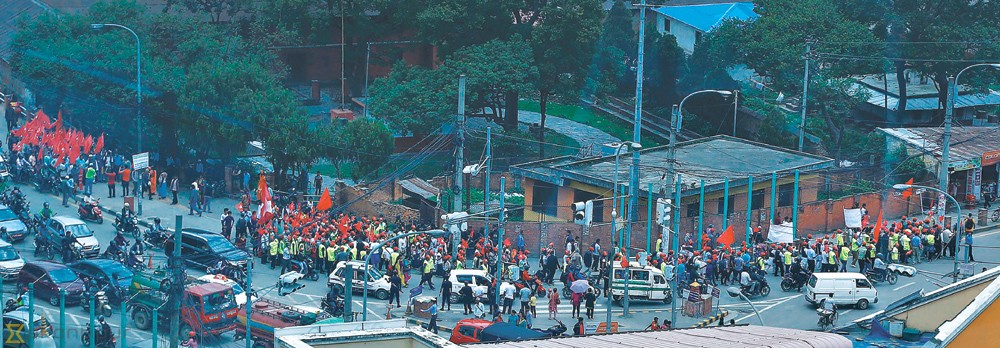In Picture:Â Naya Shakti Nepal campaigners proceed for the Tripureshwor-based Dashrath Stadium, where Baburam Bhattarai (inset) launched the party on Sunday, at Thapathali in Kathmandu. In a move desired to be followed by all demonstrators, the party supporters were careful enough not to disrupt traffic movement during their procession.
Kathmandu, June 13, 2016:Â Led by a former ideologue of the Maoist party that waged the decade-long insurgency, leaders and activists of the Naya Shakti Nepal formalised their nascent political movement into a party on Sunday amid an oath administered en masse by Baburam Bhattarai at Dashrath Stadium.
Those unable to attend the ceremony in person were asked to take the oath virtually—through a live YouTube streaming of the event, indicating at the role technology will play in shaping the new outfit and the youth that party leaders want to tap into.
The formal announcement that came nine months after former prime minister Bhattarai left the erstwhile UCPN (Maoist) party was anything but a formality. With organisers claiming to have brought over 100,000 people to the event—observers said there could be up to 50,000, it was a show of strength for a new political force that has its fair share of sceptics, including comrades in the old party.
“As far as I know, this is the first time a party has been formed through a mass gathering,†said Bhattarai, coordinator of the new party, addressing the event.
Promising change, good governance and an end to politics as usual—and aided by a sleek paid media campaign culminating in ‘jacket ads’ in almost all dailies on Sunday morning, the party announcement, however, did not live up to the hype of freshness. The cultural troupes and choice of star as the party symbol resonated heavily with the old party that Bhattarai and a majority of leaders and cadres had left behind.
“Naya Shakti is in the shadow of Baburam Bhattarai,†said Jhalak Subedi, an analyst and former editor of a left-leaning monthly. “And Baburam cannot free himself of his legacy of the Maoist insurgency.â€
At least on Sunday, Bhattarai made no attempt to disown his past.
Donning a red cap with a star on the front, Bhattarai sought to justify his new party as the call of history. Invoking the valour and vision of leaders since king Prithvi Narayan Shah to prime minister Bhimsen Thapa, Bhattarai sought to put himself among leaders who understood and accepted their call of duty.
“Every epoch poses leaders of the time a recurring question: What is the main task of this age?†said Bhattarai. “Only those who have the vision and ability to fulfill the task of the time leave a legacy behind.â€
Describing Nepal’s unification and the subsequent democratic movement, Maoist insurgency and Madhes movement as the natural course of history, he said time had come for a new stage of Nepal’s evolution into a “prosperous, equitable and inclusive democracy.â€
Bhattarai said that he and his fellow leaders of the Naya Shakti are seeking to build on the foundation of what has been achieved so far.
“We are not just going to be an addition to the current 180 political parties,†he said. “We are an alternative force in politics, offering a different vision.â€
Admitting that there is still some work to be done to “strengthen democracy and nationalism,†he said that both would feel hollow without economic empowerment.
“If we still continue to ignore prosperity, our democracy and national independence will be as good as a piece of paper,†Bhattarai said.
Bhattarai said it would be possible to end poverty within seven years, make Nepal a middle income country by doubling the income in 15 years, and convert Nepal into one of the richest countries in the world within his lifetime or 25 years.
“People look for an alternative when the existing major political forces fail to deliver,†said Analyst Subedi. “Many will watch from the sidelines how this nascent political force evolves and then decide.â€
Some say that Naya Shakti will attract middle class people and those disillusioned by three major parties and that the party has the potential to become a major force. Others are sceptical of how a party dominated by former Maoists and led by a former Maoist ideologue could inspire anything new.
“Naya Shakti is basically offering a socialist programme couched in the language of prosperity,†said Shyam Shrestha, a member of parliament, who has kept close tabs on left politics. “By that standard, every other party now speaks of prosperity. Look at the recent government budget, for example.â€
Party no threat for UML: Oli
KATHMANDU: Prime Minister KP Sharma Oli has remarked that the Naya Shakti could challenge other parties, except his CPN-UML.
Speaking at the party’s inauguration on Sunday, Chairman Oli said he was optimistic about the new party and did not have any prejudices against it. “I wish this party works for the country, people, peace, stability and development,†said Oli. Nepali Congress President Sher Bahadur Deuba stressed the need for cooperation among all the parties to take the country on the path of economic progress.
CPN (Maoist Centre) leader Krishna Bahadur Mahara said new political forces emerged every decade but all of them had failed to live up to public expectations.
“The people have been looking for an alternative [force] every decade, which has remained elusive,†said Mahara. “I hope Naya Shakti doesn’t shatter their hope.â€
By John Narayan Parajuli







